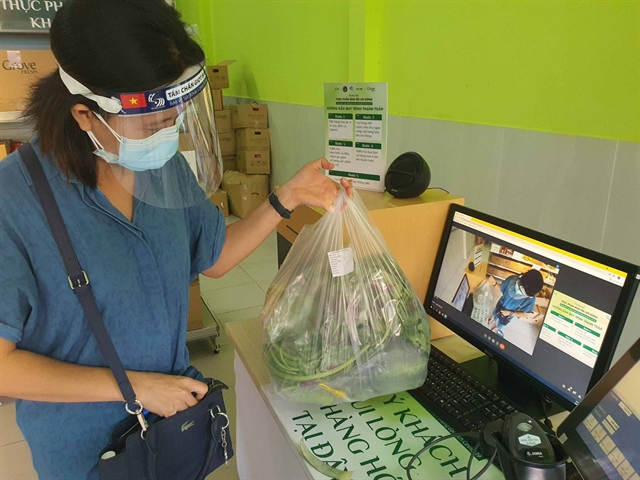 Economy
Economy


|
| A buyer pays for food items at the Grove Fresh store via an online-connected screen. Photo vir.com.vn |
HCM CITY — With contactless payment becoming increasingly common in HCM City due to people’s fear of COVID-19, retail firms are investing more and more in digital infrastructure.
The first Vietnamese digital platform for retail necessities, G Market, was launched in HCM City by Grove Fresh Group in collaboration with the city Department of Industry and Trade.
It offers over 10,000 key necessities through a close-ended ‘Farm-Factory-Hub-Door’ process.
Goods are selected from qualified farms and factories (Farm-Factory) and transported to and stored in ideal temperature conditions at a specialised warehouse system (Hub).
There they are checked, screened and packed, and delivered by staff to customers (Door).
A Grove Fresh spokesperson said for each order placed on www.gmarket24h.com, customers would be given a unique code, and they could use it at the smart automatic warehouse to pick up their goods if they want.
Customers can also shop in stores without making direct contact with staff by using pre-arranged instruction boards and an online-connected screen.
Nguyễn Thành Nhân, general director of Grove Fresh Group, said four tonnes of many essential items such as meat, fish, eggs, rice, fruits, and vegetables are sold every day.
Since the fourth COVID outbreak began in April, Grove Fresh Group has partnered with the city to supply goods.
It is expected that in mid-January it will launch a 24/7 vending machine to serve customers for Tết (Lunar New Year).
Companies are focusing on investing in infrastructure and technology for non-cash payments, especially electronic payments, with improved quality, meeting the increasing demands of consumers.
The prolonged lockdowns that kept people at home and the fear of contracting COVID-19 have accelerated consumers’ preference for digital transactions.
According to the surveys, 67 per cent of consumers said they would like to use contactless payments wherever applicable.
Besides, financial institutions have been competing to develop the best digital platforms for customers through apps that are secure, user-friendly and fully integrated.
Nguyễn Anh Đức, general director of Saigon Co.op, said the rate of cashless payment at Co.opmart, Co.opXtra, Co.op Food, and Co.op Smile increased sharply in recent years to nearly 21 per cent last year.
It targets 30 per cent within three to four years, he said.
Saigon Co.op has been collaborating with various companies to deploy a series of new payment services and applications based on tech platforms that offer more convenience to customers shopping at its over 800 stores, he added.
Multiple factors have caused this surge in cashless payments including the impact of telecommunications, which has eliminated the “strangeness” consumers used to feel about cashless payments, and the COVID-19 pandemic, which acted as a catalyst.
Others include the improved infrastructure for connecting retailers and payment service providers and legal mechanisms to protect customers, which has increased their trust in the safety of digital payments.
AppotaPay forecast the cashless payment market would grow strongly in the next three to five years, with mobile money and e-wallets becoming key to expanding non-cash payments.
A recent report by the Government said cashless payments topped VNĐ36.28 quadrillion (US$1.6 billion) in the first nine months of this year, including VNĐ13.5 quadrillion via mobile phones, the latter representing a 93.69 per cent increase.
The growth was led by digital wallets, contactless payments and QR code payments.
Contactless cards led the way in the food and dining category, with 67 per cent of consumers using them in 2020 for bill payments (71 per cent), retail shopping (58 per cent) and supermarket shopping (57 per cent).
Vietnamese consumers have quickly adopted new ways of paying that do not involve physical contact such as tapping to pay. — VNS




